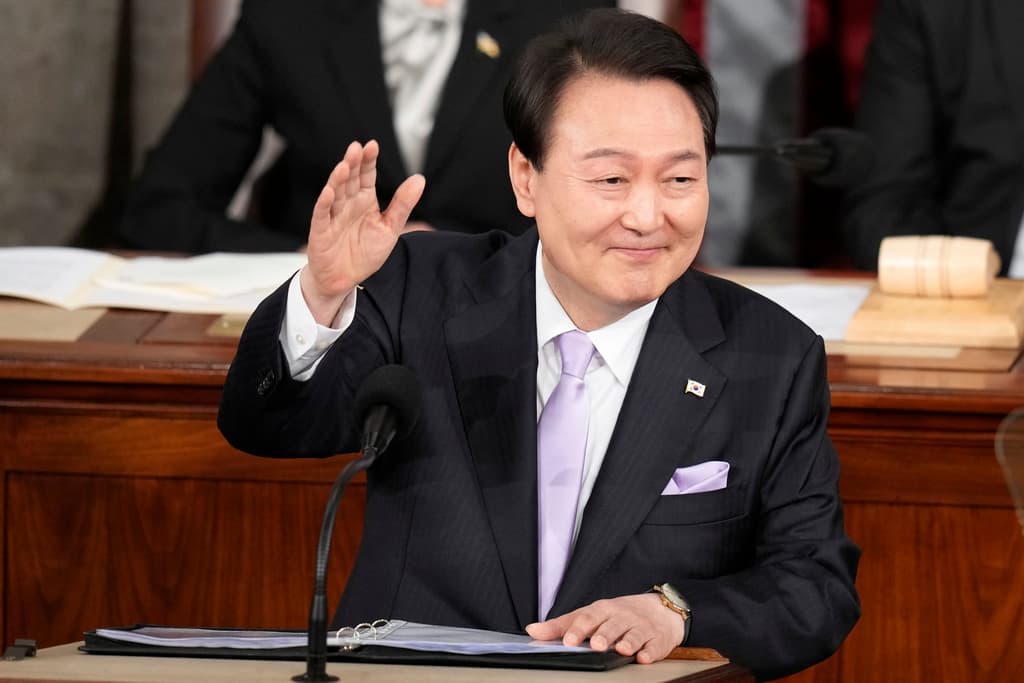Washington Struggles To Protect America’s Alliance With Korea Should Impeachment Effort Prevail Against President Yoon
Deputy state secretary, Kurt Campbell, leaves no doubt of high-level concerns about a breakdown of the alliance.

Washington is struggling to salvage the Korean American alliance for fear of the ouster of South Korea’s impeached president, Yoon Suk-yeol, and the upcoming presidency of Donald Trump.
The deputy secretary of state, Kurt Campbell, left no doubt of high-level concerns about the breakdown of the alliance — and the need to maintain the status quo — in a hastily arranged briefing for Korean journalists in Washington.
Mr. Campbell, with a long record of fostering and applauding close ties between Washington and Seoul, pledged “in person engagement” with top South Korean leaders “during the last weeks of the Biden administration,” according to South Korea’s Yonhap News.
In “a roundtable “at the Foreign Press Center in Washington, Mr. Campbell clearly offered his support for the Korean prime minister who became South Korea’s acting president, Han Duck-soo, after Mr. Yoon’s impeachment last Saturday by the national assembly.
Messrs. Campbell and Han got to know each other well when Mr. Han served as South Korea’s ambassador to Washington during President Obama’s second term in the White House. “We fully support his interim role,” he said, “and we will do what’s best to continue to send the signal of deep engagement.”
That comment was seen as showing Washington’s yearning for Mr. Yoon to keep his job when the country’s constitutional court decides whether or not to uphold the impeachment motion. Mr. Yoon, since his election by a razor-thin margin over the Minju or Democratic party leader, Lee Jae-myung, in 2022, has sided with the Pentagon in approving joint military exercises with the Americans after the previous president, the leftist Moon Jae-in, blocked them.
Mr. Campbell’s emphasis on intense dialogue with Seoul before Mr. Biden relinquishes power to Mr. Trump on January 20 also reflected worries that Mr. Trump would bring about sweeping changes in Washington-Seoul relations.
“The main political concern,” writes a noted Korean analyst, Shim Jae-hoon, “rests with Trump’s obsession with resolving North Korea’s nuclear program.” South Korean officials “are tense over Trump’s boasts during a campaign tour that he could restart talks with North Korea’s dictator Kim Jong Un, who he said remains anxious to see him again.”
Also worrisome, says Mr. Shim, longtime correspondent for the Far Eastern Economic Review, is Mr. Trump’s “demand” that Seoul pay much more than the $1.1 billion that South Korea has agreed to contribute to the costs of maintaining America’s 28,500 troops in Korea. Mr. Trump, Mr. Shim notes, has called South Korea “a money machine.”
More immediately, though, American officials are working to make sure the Korean-American alliance, dating from the Korean War, does not disintegrate if Mr. Yoon is driven from office by an adverse ruling by the constitutional court. Although Mr. Yoon no longer has the authority of the president, he still has the title. Mr. Han, whom Mr. Yoon appointed as prime minister, is also expected to want to maintain strong ties with Washington.
Mr. Campbell, whom South Korean activists have accused of interfering in South Korean affairs, was cautious when asked what Mr. Trump might do to Korean-American relations. Mr. Trump “continues to be very focused on North Korea and Kim Jong-un,” he was quoted as saying. “I cannot say whether he will be effective in this kind of diplomacy that he sought in both Singapore and Vietnam.” That’s a reference to President Trump’s summits with Mr. Kim at Singapore in June 2018 and at Hanoi in February 2019.
Anxious to show that Washington would work with whoever takes over as president in a snap election that would be held if Mr. Yoon is ousted, Mr. Campbell declared, “We have supported the constitutional steps that Korea has taken, and we’ve expressed confidence in Korea to manage through this challenging period.”

